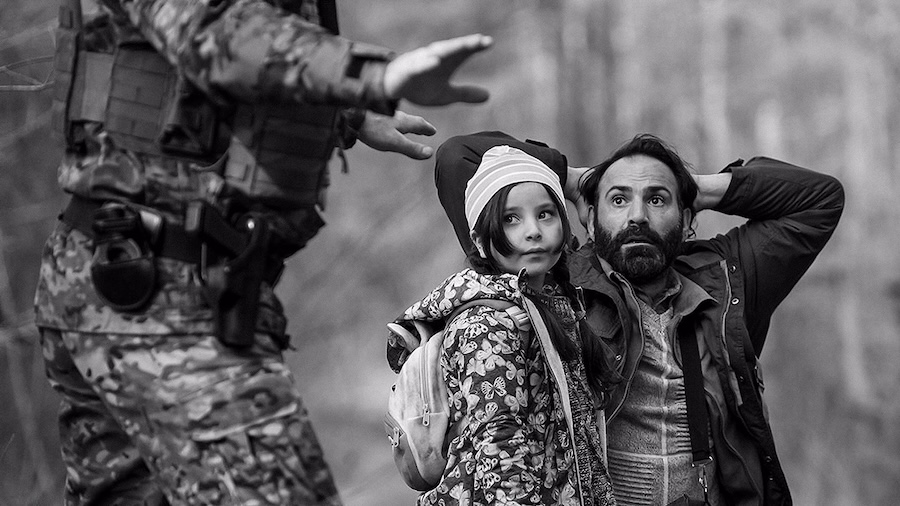

Director Agnieszka Holland has lived a life where she has tasted the worst of autocratic far-right and Communist ideologies. Her experiences are reflected in her work. But she had never made a more controversial film than Green Border and it made the entire Polish government turn on her. In the eyes of the far-right Law and Justice party, neither Poland nor Poles can do wrong. Watching a film where Polish border guards mistreat refugees infuriated them; in fact, in many cases they did not even see the film, only read about its subject and reacted accordingly. Ministers lined up to call the movie ”disgusting” and accused Holland of resorting to ”Nazi tactics”.
The director, who had to hire security to protect herself from Law and Justice supporters, refused to stand down. Holland’s rage is evident throughout Green Border, a heartbreaker and one of her very best films.
Hoping to get to Sweden
In the forests between Belarus and Poland, a group of refugees are driven by human smugglers. Among them are a family of Syrians escaping from the civil war in their country, including Bashir (Jalal Altawil) and his young son Nur (Taim Ajjan). They’re hoping to get to Sweden where they have relatives. There’s also Leïla (Behi Djanati Atai) who’s on the run from the war in Afghanistan and the murderous Taliban; she wants to stay in Poland. When they get to the border, they’re told to cross it, but are soon apprehended by Polish guards – who proceed to drive them back to the border.
The refugees soon realize that they’re trapped; both sides keep rounding them up and do their best to get them across the border, without provoking gunfire from the other side.
Putting pressure on the European Union
Holland’s aim was to depict the absurdities and inhumanity of a hybrid war taking place on this border, caused by the dictators in Moscow and Minsk, who figured sending refugees in great numbers to the border will put pressure on the European Union. People escaping war became simple pawns in these men’s games. When Holland and her fellow screenwriters, Maciej Pisuk and Gabriela Lazarkiewicz, looked into the situation they interviewed Polish guards, refugees, activists and people who live in this area. Soon, they realized just how awfully people were treated and a screenplay came about portraying not just the refugees, but also a group of activists, including a woman (Maja Ostazewska) who’s shaken out of her comfortable life and starts taking risks; the writers also invented a young character, Jan (Tomasz Wlosok), who works as a border guard, has a pregnant girlfriend at home, and is beginning to suffer mentally because of his work.
Holland throws us straight into the horror and maintains her grip almost to the very end, showing over and over again how sadism and callousness trump compassion among young, armed men who have been taught inhumanity from the top. Misery porn, according to some critics, but Holland claimed it was all based on fact, and she knows better than to wallow in suffering; there’s also a lot of tension here, even a sense of humor in how the activists are portrayed – obviously also very dark tragicomedy in the Sisyphean task of transporting the refugees back and forth.
Agnieszka Holland succeeds in making us see the refugees not as merely a collective, but individuals.
Shot in Poland, the film’s stark black-and-white cinematography takes us to an area where a game of hide-and-seek goes on between guards and refugees; it’s beautiful, but deadly. Holland succeeds in making us see the refugees not as merely a collective, but individuals; Atai stands out as the Afghan woman who connects with Nur, the Syrian boy.
Green Border 2023-Poland-Czech Republic-France-Belgium. 147 min. B/W. Directed by Agnieszka Holland. Screenplay: Maciej Pisuk, Gabriela Lazarkiewicz, Agnieszka Holland. Cinematography: Tomasz Naumiuk. Cast: Jalal Altawil (Bashir), Maja Ostazewska (Julia), Behi Djanati Atai (Leïla), Tomasz Wlosok (Jan), Al Rashi Mohamad, Dalia Naous.
Trivia: Original title: Zielona granica. Co-produced by Holland.
Venice: Special Jury Prize, Best Film in a Foreign Language.
Last word: “We thought that black and white would be metaphorical, and somehow connected to the past, the Second World War, documentary-like. You can control visually and artistically much better that way, especially because we shot it extremely fast, in 24 days, with three units, the main one being mine. And we edited it very fast. We didn’t want to make it sentimental or manipulative. We didn’t want to get too emotional, we wanted to make it sober, to be as close to the human beings as possible.” (Holland, Vulture)
